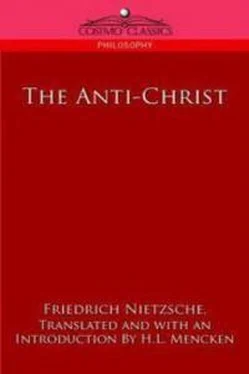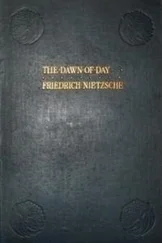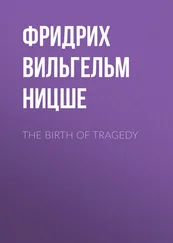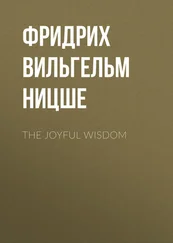A word now against Kant as a moralist. A virtue must be our invention; it must spring out of our personal need and defence. In every other case it is a source of danger. That which does not belong to our life menaces it; a virtue which has its roots in mere respect for the concept of "virtue," as Kant would have it, is pernicious. "Virtue," "duty," "good for its own sake," goodness grounded upon impersonality or a notion of universal validity—these are all chimeras, and in them one finds only an expression of the decay, the last collapse of life, the Chinese spirit of Königsberg. Quite the contrary is demanded by the most profound laws of self–preservation and of growth: to wit, that every man find his own virtue, his own categorical imperative. A nation goes to pieces when it confounds its duty with the general concept of duty. Nothing works a more complete and penetrating disaster than every "impersonal" duty, every sacrifice before the Moloch of abstraction.—To think that no one has thought of Kant's categorical imperative as dangerous to life !…The theological instinct alone took it under protection!—An action prompted by the life–instinct proves that it is a right action by the amount of pleasure that goes with it: and yet that Nihilist, with his bowels of Christian dogmatism, regarded pleasure as an objection …. What destroys a man more quickly than to work, think and feel without inner necessity, without any deep personal desire, without pleasure—as a mere automaton of duty? That is the recipe for décadence , and no less for idiocy…. Kant became an idiot.—And such a man was the contemporary of Goethe! This calamitous spinner of cobwebs passed for the German philosopher—still passes today!…I forbid myself to say what I think of the Germans…. Didn't Kant see in the French Revolution the transformation of the state from the inorganic form to the organic ? Didn't he ask himself if there was a single event that could be explained save on the assumption of a moral faculty in man, so that on the basis of it, "the tendency of mankind toward the good" could be explained , once and for all time? Kant's answer: "That is revolution." Instinct at fault in everything and anything, instinct as a revolt against nature, German décadence as a philosophy— that is Kant !
I put aside a few sceptics, the types of decency in the history of philosophy: the rest haven't the slightest conception of intellectual integrity. They behave like women, all these great enthusiasts and prodigies—they regard "beautiful feelings" as arguments, the "heaving breast" as the bellows of divine inspiration, conviction as the criterion of truth. In the end, with "German" innocence, Kant tried to give a scientific flavour to this form of corruption, this dearth of intellectual conscience, by calling it "practical reason." He deliberately invented a variety of reasons for use on occasions when it was desirable not to trouble with reason—that is, when morality, when the sublime command "thou shalt," was heard. When one recalls the fact that, among all peoples, the philosopher is no more than a development from the old type of priest, this inheritance from the priest, this fraud upon self , ceases to be remarkable. When a man feels that he has a divine mission, say to lift up, to save or to liberate mankind—when a man feels the divine spark in his heart and believes that he is the mouthpiece of supernatural imperatives—when such a mission inflames him, it is only natural that he should stand beyond all merely reasonable standards of judgment. He feels that he is himself sanctified by this mission, that he is himself a type of a higher order!…What has a priest to do with philosophy! He stands far above it!—And hitherto the priest has ruled !—He has determined the meaning of "true" and "not true"!…
Let us not underestimate this fact: that we ourselves , we free spirits, are already a "transvaluation of all values," a visualized declaration of war and victory against all the old concepts of "true" and "not true." The most valuable intuitions are the last to be attained; the most valuable of all are those which determine methods . All the methods, all the principles of the scientific spirit of today, were the targets for thousands of years of the most profound contempt; if a man inclined to them he was excluded from the society of "decent" people—he passed as "an enemy of God," as a scoffer at the truth, as one "possessed." As a man of science, he belonged to the Chandala [2] The lowest of the Hindu castes.
…. We have had the whole pathetic stupidity of mankind against us—their every notion of what the truth ought to be, of what the service of the truth ought to be—their every "thou shalt" was launched against us…. Our objectives, our methods, our quiet, cautious, distrustful manner—all appeared to them as absolutely discreditable and contemptible.—Looking back, one may almost ask one's self with reason if it was not actually an aesthetic sense that kept men blind so long: what they demanded of the truth was picturesque effectiveness, and of the learned a strong appeal to their senses. It was our modesty that stood out longest against their taste…. How well they guessed that, these turkey–cocks of God!
We have unlearned something. We have become more modest in every way. We no longer derive man from the "spirit," from the "godhead"; we have dropped him back among the beasts. We regard him as the strongest of the beasts because he is the craftiest; one of the results thereof is his intellectuality. On the other hand, we guard ourselves against a conceit which would assert itself even here: that man is the great second thought in the process of organic evolution. He is, in truth, anything but the crown of creation: beside him stand many other animals, all at similar stages of development…. And even when we say that we say a bit too much, for man, relatively speaking, is the most botched of all the animals and the sickliest, and he has wandered the most dangerously from his instincts—though for all that, to be sure, he remains the most interesting !—As regards the lower animals, it was Descartes who first had the really admirable daring to describe them as machina ; the whole of our physiology is directed toward proving the truth of this doctrine. Moreover, it is illogical to set man apart, as Descartes did: what we know of man today is limited precisely by the extent to which we have regarded him, too, as a machine. Formerly we accorded to man, as his inheritance from some higher order of beings, what was called "free will"; now we have taken even this will from him, for the term no longer describes anything that we can understand. The old word "will" now connotes only a sort of result, an individual reaction, that follows inevitably upon a series of partly discordant and partly harmonious stimuli—the will no longer "acts," or "moves."…Formerly it was thought that man's consciousness, his "spirit," offered evidence of his high origin, his divinity. That he might be perfected , he was advised, tortoise–like, to draw his senses in, to have no traffic with earthly things, to shuffle off his mortal coil—then only the important part of him, the "pure spirit," would remain. Here again we have thought out the thing better: to us consciousness, or "the spirit," appears as a symptom of a relative imperfection of the organism, as an experiment, a groping, a misunderstanding, as an affliction which uses up nervous force unnecessarily—we deny that anything can be done perfectly so long as it is done consciously. The "pure spirit" is a piece of pure stupidity: take away the nervous system and the senses, the so–called "mortal shell," and the rest is miscalculation —that is all!…
Читать дальше











